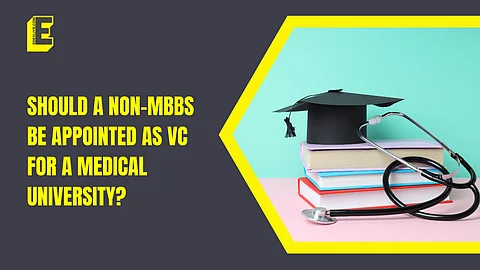

The appointment of Prof Pramod Yeole as the new Vice-Chancellor (VC) of Rajasthan University of Health Sciences (RUHS) has sparked a heated debate on whether non-MBBS graduates should be allowed to govern medical institutions or not.
Rajasthan Governor Haribhau Bagde appointed Pramod Yeole, a PhD holder in Pharmaceutical Sciences, as the VC of RUHS, which oversees 30 medical colleges in Rajasthan. Yeole previously served as Vice-Chancellor of Dr Babasaheb Ambedkar Marathwada University and as Pro-VC of Rashtrasant Tukadoji Maharaj Nagpur University.
While medicos has strongly opposed the decision, a section of medical educators, including MSc and PhD holders, argue that such appointments should not be restricted to MBBS degree holders.
The controversy
His appointment, however, has been met with backlash from medical professionals who believe that a health university should be led by someone with a medical degree.
The Indian Medical Association's (IMA) Rajasthan chapter has strongly opposed Yeole’s appointment, arguing that it compromises the standards of medical education and research.
The association has written to the governor, urging that the decision be revoked, and has even threatened statewide protests in medical colleges.
Dr Praveen Chand Garg, State Secretary of IMA Rajasthan, criticised the decision, stating, “RUHS is a health university, and it should be led by a medical professional. Pramod Yeole is not a qualified doctor; he holds expertise in a specific subject but does not have an MBBS degree. How can a person who is not a doctor understand the complexities of medical education? It’s like asking a Sanskrit teacher to evaluate an English exam.”
However, MSc and PhD faculty members argue that an MBBS degree is not essential for administrative leadership in a medical university.
They point out that many prestigious universities have PhD holders as vice-chancellors, even in institutions with affiliated medical colleges. The National MSc Medical Teachers’ Association (NMMTA) has defended Yeole’s appointment, calling the opposition discriminatory.
Dr Ayan Kumar Das, Secretary of NMMTA, equated the resistance to a rigid mindset that excludes non-MBBS professionals.
"Universities across the country, including those with medical colleges, have PhD holders as vice-chancellors. Why is an MBBS degree suddenly necessary for an administrative post? If we follow this logic, even the Prime Minister and Health Minister would need MBBS degrees to govern. This demand is nothing but discrimination," he told EdexLive.
He also highlighted how policies like the National Medical Commission’s (NMC) 2020 reforms have reduced opportunities for MSc and PhD teachers, worsening the faculty shortage in medical education.
“India follows Competency-Based Medical Education (CBME), a model adopted from the US, where non-MBBS educators play a significant role. But in India, qualified MSc and PhD teachers are being systematically removed. This isn’t just about one appointment — it’s a broader fight against exclusionary policies,” he added.
A larger debate
The RUHS VC appointment has ignited a larger debate on the role of non-MBBS professionals in medical education. While doctors argue that only medical graduates can understand and address the complexities of medical training, MSc and PhD educators see this as an attempt to sideline qualified professionals.
But the debate is not a new one.
In October 2020, the NMC issued regulations that reduced the allowable percentage of non-medical teachers in various departments. For subjects like Anatomy, Physiology, and Biochemistry, the permissible percentage of non-medical teachers was reduced from 30 per cent to 15 per cent.
For Pharmacology and Microbiology, the allowance for non-medical teachers was entirely removed.
The reforms also brought to the surface concerns of existing faculty shortages in medical colleges and universities in India.
